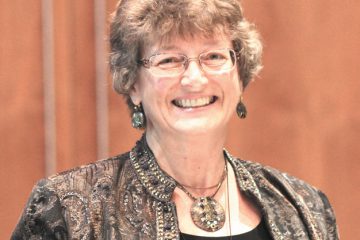Word to the wise
A look at the Holy Book series by Candace R. Kwiatek, The Jewish Family Identity Forum, The Dayton Jewish Observer

My middle-school students recently expressed interest in learning Kabalah. A topic with the qualities of quicksand, Kabalah traditionally is not studied until the age of 40, and even then only by the most accomplished scholars. On the other hand, even teens have heard about this mystical tradition in its pop-culture versions popularized by celebrities such as Madonna and Britney Spears.
Unwilling to settle for the commercialized “red string and blessed water” version, I eventually discovered some authentic teen-friendly nuggets of Kabalah wisdom applicable to teens’ everyday lives.
But that discovery set me to thinking: the Bible, too, often feels like quicksand to the layperson, daunting and ungraspable. Could a nugget of applicable, universally appealing wisdom be distilled from some popular biblical books in an easily replicable process? I decided to find out.
Purpose. The approach of Purim brought to mind Mordechai’s admonition to Queen Esther as he requested her help in saving the Jews of Shushan (Esther 4:14): “For if you remain silent at this time, relief and deliverance for the Jews will arise from another place… And who knows but that you have come to your royal position for such a time as this?”
Like most royalty, it’s easy to live self-absorbed ego-driven lives. But what if we saw ourselves as part of a bigger picture? What if we approached each day with the thoughts, “What is my ultimate reason for being here? How can I make each moment count? Where will I be able to make a difference, small or large, today? In what way could I enhance others’ lives? Do I have an ‘Esther’ opportunity today?” How would our lives be richer and more fulfilled if we chose to live, in Pastor Rick Warren’s words, purpose-driven lives?
Community. In Genesis, God notes that “It is not good for man to be alone (2:18),” and goes on to create woman. Applying the statement more generally, however, the message is clear: people need other people. In that vein, Jewish tradition teaches that one should always study with a partner, never alone, to enhance the learning potential.
Similarly, when I prepare lessons, design programs, write articles, or develop proposals, I know I do a better job when I seek input from others: more ideas, more enthusiasm, more perspectives.
Families, friends, social gatherings, clubs, worship services, and community activities are critical to our human health. It’s no surprise that one of the names for a synagogue is beit kehillah, house of gathering. It is also interesting to note that today’s surveys, commentaries, and articles about Jewish Millennials highlight this demographic’s overwhelming desire for relationship-based Jewish communities, not those centered on rituals or programs.
Context. When a new pharaoh “who didn’t know Joseph” arose over Egypt (Ex. 1:8), he initiated the saga of the Exodus. Here we learn the critical importance of context to understanding and decision-making. We see the results of lack of context all the time in Middle East reporting. The seriousness of theft or killing is determined by context. We alter our easy-going or business-proper language and dress depending on context.
The appropriate response to a friend’s late arrival depends on context. Shouldn’t we insist on knowing the context before taking action or making decisions?
Holiness. “You shall be holy…I the Lord am your God (Lev. 19:2-4).” Holiness is putting “made in the likeness of God’s image” into practice, acting more like an angel than an animal.
My favorite example is that licking the empty ice cream bowl isn’t immoral or unethical, but it also isn’t holy. And “I the Lord am your God” is a reminder that, even when no one is around, when you can’t be seen by others, or when “you’re not wearing a name tag,” the expectation of holy behavior is still in effect. It’s the biblical version of C. S. Lewis’ dictum, “Integrity is doing the right thing, even when no one is watching.”
Image. “We looked like grasshoppers to ourselves, and so we must have looked to them,” 10 of the 12 spies report (Num. 13:33).
Self-image impacts how others perceive us in large part because it affects how we make decisions, who we befriend, and how we behave. At the same time, those very same factors — decision-making, friendships, and behavior — influence self-image. Since those factors are in our control, then we are largely responsible for our own self-image and others’ perceptions of us as well.
Covenant. You are to “be Torah” in every generation, Moses reminds the Israelites in his closing speech: “It was not with our fathers that the Lord made this covenant, but with us, the living, every one of us who is here today (Deut. 5:3).”
Clearly, his words are meant to speak directly to us, even today. The covenant at Sinai wasn’t just a momentary agreement, but an ongoing commitment to a whole new system of thinking, acting, and relating to one another and to the world as a whole. Are we up to the challenge?
Improvement. At his inaugural pagan bacchanal, the self-important Babylonian King Belshazzar became alarmed by mysterious writing on the wall: “…you have been weighed in the balance and found wanting (Dan. 5:27).” If the same writing appeared on your wall, what would come to mind? How would you respond?
Every book in the Bible offers at least one word to the wise, advice that transcends time and place and is accessible to everyone. Will you search for the nuggets of wisdom that speak to you? More importantly, how will you put them into practice?
Family Discussion: In Job 1:7 we read the following interchange: “The Lord said to the Adversary (Satan/temptation), ‘Where have you been?’ The Adversary answered the Lord, ‘I have been roaming all over the earth.’ In what way is this biblical text a word to the wise?
Literature to share
The Girl with a Brave Heart: A Tale from Tehran by Rita Jahanforuz and Vali Mintzi. Illustrated with playful Matisse-like images in the colors of Middle Eastern markets, this beautiful tale is an unusual twist on the Cinderella story. You won’t read it just once. For elementary ages and adults alike.
Jerusalem: the Biography by Simon Sebag Montefiore. This novel-like biography of the world’s most influential city by an award-winning British author and journalist is well worth the effort. While not a quick read, it is neither overly scholarly nor partial to a single religious or political viewpoint. If you’d like to gain a better understanding of the region — its history, its characters, and its issues — this is a great one-stop shop.
To read the complete March 2014 Dayton Jewish Observer, click here.



